|
|
|
Sort Order |
|
|
|
Items / Page
|
|
|
|
|
|
|
| Srl | Item |
| 1 |
ID:
126041


|
|
|
|
|
| Publication |
2013.
|
| Summary/Abstract |
Neither well-being nor suffering can be understood without understanding how the two experiences are related. In this paper, the author focuses on the experiences of well-being and suffering in everyday, mundane contexts, such as food preparation, cleaning and hospitality. Data presented are drawn from fieldwork conducted among ethnic Kyrgyz and Uzbeks in southern Kyrgyzstan, shortly after independence. The author discusses how the experiences of well-being and suffering are informed by symbolic systems that are linked to religious beliefs. This examination contributes to an understanding of the power of religious symbols, arguing that the expectations of well-being or suffering make systems of religious symbols more compelling.
|
|
|
|
|
|
|
|
|
|
|
|
|
|
|
|
| 2 |
ID:
091711
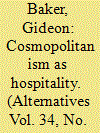

|
|
|
|
|
| Publication |
2009.
|
| Summary/Abstract |
For many cosmopolitans, an emergent global civil society is reframing the relationship between the universal and particular in world politics in ways that do justice to both. This article disputes this claim, finding that the concept of global civil society shares the same fundamental problem as state sovereignty, namely that it is better at articulating global identity than difference because it reproduces in different form statist attempts to describe a universal structure of particularity. It then argues that to avoid reducing difference to identity while remaining true to the cosmopolitan impulse to ethical universality, that is, to recognition of moral obligations to foreigners, it is necessary to take cosmopolitanism as synonymous with an ethics of hospitality enabling a nondialectical account of identity and difference in cosmopolitanism. As Derrida affirms, hospitality deconstructs the binary of identity and difference in our ethical relations with strangers. This dialectic-defying quality of cosmopolitanism-as-hospitality requires a greater decisionism than dialectical liberal-cosmopolitanism, turning cosmopolitanism away from the pure ethics of its liberal variants and transforming it into an ethicopolitics.
|
|
|
|
|
|
|
|
|
|
|
|
|
|
|
|
| 3 |
ID:
095986


|
|
|
|
|
| Publication |
2010.
|
| Summary/Abstract |
By way of a discussion of the deliberately hard case of humanitarian intervention, this article considers the merits of an alternative cosmopolitan ethics to that of liberal cosmopolitanism, one which founds its universalism on an ethics of hospitality rather than the rights of man. Jacques Derrida describes the ethics of hospitality as defined by an unconditional welcome which nonetheless must become conditional in order to function. This leads to a profound paradox - an 'undecidability' - in the practice of the ethics of hospitality, the implications of which need to be better understood if the ambition of 'another cosmopolitanism' is to be realised. Interrogating the ethics of hospitality and the undecidability to which it gives rise in relation to humanitarian intervention, it is argued that responsibilities to others, which sometimes imply intervention, must always be kept in tension with openness to the coming of the Other, which limits intervention. Far from being blind or paralysing action, such 'bounded undecidability', it is suggested, actually defines the site of responsible, just decisions in humanitarian intervention.
|
|
|
|
|
|
|
|
|
|
|
|
|
|
|
|
| 4 |
ID:
187509
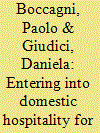

|
|
|
|
|
| Summary/Abstract |
Grassroots refugee hospitality is an innovative, if still little investigated field of practices, which illuminates and reshapes the native/immigrant divide. It also sheds light on ‘domestic humanitarianism’, as a range of everyday modes of helping that take place even in the domestic space. Drawing on a case study in Northern Italy, this article develops a framework on the societal implications of refugee hospitality, based on a multi-scalar view of home . From the inside, the lived experience of hospitality involves profound re-definitions of domesticity and meaningful personal changes for hosts and guests alike. From the outside, the connective function of local actors is crucial in shaping the lived experience of domestic reception. From the bottom up, hosting refugees is tantamount to opening, hence questioning, the most intimate threshold of the ‘national we’. Overall, and despite its limitations, domestic hospitality enables refugees to enter ‘home’ on different scales, from the micro-literal to the macro-metaphorical, thereby providing a potential counter-narrative to anti-immigrant discourses, emotions and politics.
|
|
|
|
|
|
|
|
|
|
|
|
|
|
|
|
| 5 |
ID:
153671


|
|
|
|
|
| Summary/Abstract |
This article explores three key arguments: Firstly, it seeks to demonstrate the contradictions and limits within Kantian hospitality, and its links to colonialism and practices of racialisation. The acclaimed universalism of Kant’s law of hospitality forecloses a discussion of its dualism, and erases the historical, racist context in which it was conceived. The prioritization of concept over conception allows Kant’s theory on race to be obscured from official discourse and framing of policies while it still courses through inherited perceptions and theories. Secondly, in making my case, I will be applying the notion of coloniality, coined by Aníbal Quijano and later developed by Walter Mignolo, to the existing but small body of critical discourse on Kant and race. Debates initiated on the peripheries of philosophy, law and anthropology in the 1990s have led the way in this regard. However, given the time that has elapsed, it is notable that their work has received little scrutiny in political theory and International Relations theory, and thus warrants renewed attention. I argue that the notion of coloniality provides a useful lens through which to do so, and a vehicle through which to apply those excavations to a contemporary context. Finally, the article explores the extent to which Kantian thought constitutes ‘modern’ cosmopolitanism, and draws attention to the inadvertently complicit role of second-generation cosmopolitans in the erasure of race from the study of Kant. The relationship between the collective erasure of race and racism in academia and European practice towards refugees and immigrants is briefly considered.
|
|
|
|
|
|
|
|
|
|
|
|
|
|
|
|
| 6 |
ID:
163811


|
|
|
|
|
| Summary/Abstract |
In times of heightened, no-longer-linear migratory flows, when migrations oscillate and even double back on their own routes, this article interrogates the unwritten social contract of hospitality between host and guest. Taking as a case study Amit Chaudhuri’s returnee narrative, Calcutta: Two Years in the City (2013)—his personal account of relocation to India—this paper juxtaposes the mismatch between hospitalities assumed and experienced, from India’s lukewarm hospitality to the expectations of its elite (even celebrity) sojourner authors, now diasporic returnee migrants. The article highlights the tensions in negotiating host–guest roles, particularly when insider–outsider, stranger–native boundaries blur. It also raises the question of whether some degree of re-orientalism is therefore inevitable in the cosmopolitan returnee’s perceptions and subsequent representations of what was once ‘home’ and now is ‘home again’.
|
|
|
|
|
|
|
|
|
|
|
|
|
|
|
|
| 7 |
ID:
145458
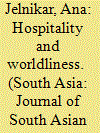

|
|
|
|
|
| Summary/Abstract |
This paper offers a new reading of Rabindranath Tagore's acclaimed novel Ghare Baire (Home and the World) by looking at it explicitly through the prism of hospitality. Drawing on the critical vocabulary of Jacques Derrida, it frames the central question of the novel as that of taking the risk of offering (un)conditional hospitality, with all its consequences. This involves exploring and tracing the ideological roots of the radical ethical position of the main protagonist, Nikhilesh, who self-consciously allows a guest to overstay his welcome. The novel is read as a paean to hospitality as risk-taking, and therefore to the frightening ordeal of freedom with ambiguous outcomes.
|
|
|
|
|
|
|
|
|
|
|
|
|
|
|
|
| 8 |
ID:
129387
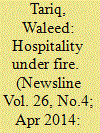

|
|
|
| 9 |
ID:
144280
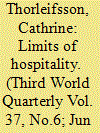

|
|
|
|
|
| Summary/Abstract |
Based on qualitative fieldwork in the Sunni village of Bebnine, located between Tripoli and the northern Syrian border, this paper explores how displaced Syrians adjust to life in Lebanon under the threat and actuality of violence. The marginalised refugees do not only appear as passive victims of crisis but draw on a diverse repertoire of coping strategies to deal with displacement and dispossession. Self-settled Syrians have exploited social networks, savings, aid, education and work opportunities to create a new livelihood system for themselves. Nevertheless, everyday life in Lebanon is not conceptualised as a safe zone. Syrian refugees are increasingly being used as scapegoats for the poor economy and political challenges in the country. While practices of hospitality towards the Syrian refugees were widespread, ambivalent feelings and prejudice frequently surfaced. Refugees expressed concern that the Syrian civil war would escalate into further sectarian violence in Lebanon, pushing the country closer to war.
|
|
|
|
|
|
|
|
|
|
|
|
|
|
|
|
| 10 |
ID:
174602
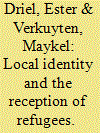

|
|
|
|
|
| Summary/Abstract |
A strong local community identity often goes together with the rejection of refugees and other migrants. However, there is also the possibility that such a local identity actually stimulates the reception of refugees. Based on the social identity perspective and our ethnographic fieldwork we examine this possibility in the context of the small town of Riace in Southern Italy. The analysis demonstrates that there is a local identity of hospitality that is construed as a continuation of the town’s past. This identity of local hospitality is enacted and maintained in various ways in the life of the town in which the mayor as an entrepreneur of the local identity plays a critical role. However, there are also some challenges to the future of the local identity of hospitality that relates to available financial resources and competition over local opportunities.
|
|
|
|
|
|
|
|
|
|
|
|
|
|
|
|
| 11 |
ID:
175147


|
|
|
|
|
| Summary/Abstract |
In Jordan mansaf has become a national symbol, consumed on major social occasions, served in various forms to tourists and visitors, and imbued with a set of historical and socio-cultural associations. Across historical Syria (Bilād ash-Shām) and northern Arabia dishes similar to what is now considered mansaf have been made and consumed in different historical contexts and have often been linked with ideas of hospitality and protection given to guests and strangers, whose alterity is negotiated and incorporated through the sharing of food. In Jordan particularly, the image of a ‘Bedouin’ feast dish of domestically produced pastoralist ingredients carries a rich symbology of hospitality and welcome, resonant of imagined historical continuities and a shared cultural heritage. This lends the modern ‘national dish’ symbolic power as a tool of nation-building in the fraught and complex environment of modern Jordan, where many claimed identities and solidarities coincide and compete. Far from being a timeless or unchanged relic of an imagined pre-modern desert life, mansaf, its ingredients and the way it is made, served, eaten and deployed have emerged out of a particular set of historical contingencies and are tied closely to projects of identity formation and state-building within the Hashemite Kingdom of Jordan. Focusing on this historical constructed-ness and changing practices of making, serving and talking about mansaf, as well as the social relations it reflects, enacts and (re)produces, this article seeks to use the dish as a lens to examine questions of changing political economy and sociality in Jordan.
|
|
|
|
|
|
|
|
|
|
|
|
|
|
|
|
| 12 |
ID:
155944


|
|
|
|
|
| Summary/Abstract |
This article examines the figure of the misafir (guest) as it personifies the combined domains of everyday and institutional hospitality in Hatay, a contested border province annexed to Turkey from French Mandate Syria in 1939, and home today to over 400,000 displaced Syrians. Based on fieldwork conducted between 2010 and 2012 in Hatay's administrative capital, Antakya, I focus on the perspectives of the region's bilingual (Turkish-Arabic) Jewish and Christian populations about the official misafir status of the first Syrian arrivals. I argue that the sudden transformation of Syrians from familial misafirs to governmental misafirs in the early days of the Syrian conflict ruptured the hierarchical domains of reciprocity that have historically shaped the cross-border relations between these communities. In this process, Antakya's religious minorities recognized and negotiated the limits of their own residence, difference, and citizenship in Turkey, and invoked the lived practices of hospitality that exist beside but also transcend ethnoreligious and national identities. By examining how historical articulations of religious and national difference along the Turkish–Syrian border are entwined with the figure of the misafir at the interpersonal level, this article contributes to debates on hospitality in scholarship on the Middle East and in migration literature.
|
|
|
|
|
|
|
|
|
|
|
|
|
|
|
|
|
|
|
|
|